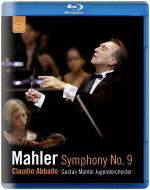|
Back
04/03/2012
Gustav Mahler: Symphony No. 9
Gustav Mahler Jugendorchester, Claudio Abbado (conductor)
Recorded live at Accademia Nazionale di Santa Cecilia, Rome (April 4, 2004) – 84’
Euroarts 2054004 – Picture format: 16:9 – Sound format: PCM Stereo & DTS Master Audio 5.1 - Region Code PAL/NTSC 0 (Free) –
Blu-ray Disc and booklet with essays in English and German

   
When it comes to the relatively new medium of Blu-ray discs, market saturation is not something that is usually an issue. This present disc, however, proves an exception. Claudio Abbado’s brilliant and critically acclaimed Mahler cycle with his hand-picked Lucerne Festival Orchestra has received the Blu-ray treatment for all but the Eighth Symphony (which is scheduled for later this year). The Ninth Symphony was the most recent installment, recorded barely a year ago. Most listeners opting for one will undoubtedly chose the latter, but for those who cannot get enough of this shattering piece, this previously released recording, despite some misgivings, should not disappoint.
Aside from not featuring the sterling Lucerne band, this recording suffers an inferior quality video track and an audio sound that is not as spacious and rich as the newest Blu-ray. While the video is still clean and vibrant, it is softer than newer productions and at least one camera angle displays some blurred edges. Indeed, it is not difficult to discern improved quality in Blu-ray films as the years go by. The sound features an immediate soundstage that may prove too overwhelming for some. The surround channels are used to such an extensive level as to make the violins and violas on either side really surround the listener, as if he were listening from the podium. This did not prove too troublesome, however, as the soundstage was still quite deep and the dynamic range extremely wide. The quietest, concluding sounds of the orchestra were thrillingly captured.
And what a memorable ending it was! The eighty minute journey was filled with some of the most touching and amiable dialogue between an orchestra and conductor I have seen up close. Many of the young players’ eyes were glued to the knowing maestro for extended passages, and their attention was not only reciprocated, it made a significant impact on the performance quality. The ensemble was impressive in their unity and soloists were exceptional. They played with a rhythmic proficiency and refined tone that belied their years. In the best sense of the term, this was a restrained ensemble. That’s not to minimize the emotional impact of the performance, which was incredibly moving. It culminated in an extended, breathtaking silence with the houselights nearly extinguished. The statement was completely free of artifice and was a beautiful gesture, from one of the most genuine and eloquent conductors around, from a style of music-making that seems long gone. Abbado’s Mahler is some of the most naturally expressive and simple being played today. He conducts with affection and care, but with little trace of sentimentality that can weigh down younger conductors. Not only is Abbado’s Mahler technically brilliant, it is refreshing. Tempos are steady, not dawdling. Climaxes are well-built and the quieter intricacies of the movements are well-paced. Even if this disc is not your first choice of Abbado Mahler Ninths, it is still Abbado conducting Mahler’s Ninth Symphony, and that is an occasion never to be missed.
Matthew Richard Martinez
|